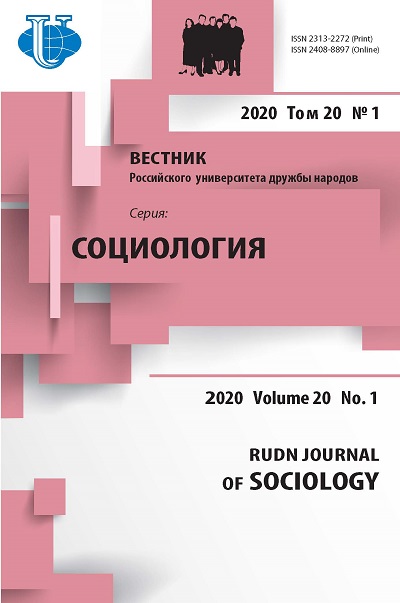The quality of life of the older generation in Belarus
- Authors: Kechyna E.A.1, Filinskaya L.V.1
-
Affiliations:
- Belarusian State University
- Issue: Vol 20, No 1 (2020)
- Pages: 30-49
- Section: Contemporary society: the urgent issues and prospects for development
- URL: https://journals.rudn.ru/sociology/article/view/22942
- DOI: https://doi.org/10.22363/2313-2272-2020-20-1-30-49
Cite item
Full Text
Abstract
The demographic aging of population typical for many countries requires much more financial and material resources to meet the needs of the post-working-age population. For the Republic of Belarus, the problem of population aging is highly relevant for the share of the elderly grows annually. The article focuses on the social-demographic characteristics and quality of life of the older generation in Belarus. The article is based on the data of the National Statistical Committee of the Republic of Belarus and the results of the sociological research “Belarus: Family, Stability of Family Relations, and Birth Rate in the Changing Social-Economic Conditions” conducted within the international research program “Generation and Gender”. The authors present a sociological-statistical approach to the analysis of the key characteristics of the elderly’s life in contemporary Belarus, which combines the information resources of sociology and statistics. The authors consider the general statistical data on the population aging and the elderly’s features and the sociological indicators revealing the perception of life at the older age. The assessment of the older generation’s life is presented as a set of indicators of the quality of life, which includes both objective statistical data and estimates of the older people’s satisfaction with various aspects of their life. For the first time in Belarus the quality of life of the 60-69- and 70-79-year-old cohorts is studied not only through statistical data but also taking into account their own assessments of various aspects of their lives, which allows to identify the most relevant issues for the social programs aimed at meeting the needs of the older generation.
About the authors
E. A. Kechyna
Belarusian State University
Author for correspondence.
Email: eakech@tut.by
доктор социологических наук, профессор кафедры социологии
Kalvariyskaya St., 9, Minsk, 220004, БеларусьL. V. Filinskaya
Belarusian State University
Email: filinskalv@gmail.com
кандидат философских наук, доцент кафедры социологии
Kalvariyskaya St., 9, Minsk, 220004, БеларусьReferences
- Babosov E.M. Kachestvo zhizni — osnovnoy kriteriy effektivnosti ekonomicheskoy sistemy [Quality of life as the main criterion of the economic system efficiency]. Obshchestvo i Ekonomika. 2019; 3 (In Russ.).
- Belarus: struktura semyi, semeinye otnosheniya, reproduktivnoe povedenie: Vol. I. Metodologiya i opyt provedeniya issledovaniya “Pokoleniya i gender” [Belarus: Family Structure, Family Relations, Reproductive Behavior: Vol. 1. Methodology and course of the study “Generations and Gender”]. D.G. Rotman, T. Emery (Ed.). Minsk; 2018 (In Russ.).
- Belarus: struktura semyi, semeinye otnosheniya, reproduktivnoe povedenie: Vol. II. Analiz rezultatov issledovanija “Pokolenija i gender” [Belarus: Family Structure, Family Relations, Reproductive Behavior: Vol. II. Analysis of the results of the study “Generations and Gender”]. O. Tereshhenko, N. Kuchera (Ed.). Minsk; 2018 (In Russ.).
- Belyaeva L.A. Kachestvo zhizni v sub’ektivnykh otsenkakh naseleniya: Rossiya v evropeyskom kontekste [Quality of life in the subjective estimates of the population: Russia in the European context]. RUDN Journal of Sociology. 2018; 18 (4) (In Russ.).
- Belarus i strany mira [Belarus and Countries of the World]. Minsk; 2018 (In Russ.).
- Hesse H. O starosti. Pisma po krugu [Hymn to Old Age]. Per s nem. Sost., avt. predisl. i komment. V.D. Sedelnik. Moscow; 1987 (In Russ.).
- Giddens A., Sutton P.W. Osnovnye ponyatiya v sotsiologii [Essential Concepts in Sociology]. Per. s angl. E. Rozhdestvenskoy, S. Gavrilenko. Moscow; 2018 (In Russ.).
- Zdorovie naselenija i socialnye peremeny v postsovetskih gosudarstvah [Public Health and Social Changes in Post-Soviet States]. P. Brigadin (Ed.). Minsk; 2013 (In Russ.).
- Kechyna EA. Sotsiologo-statisticheskoe issledovanie [Sociological-Statistical Research]. Minsk; 2012 (In Russ.).
- Kosharnaya G.B., Shchanina E.V. Faktory deprivatsii pozhilykh lyudey v sotsialno-trudovoy sfere: regionalny aspect [Deprivation factors for the elderly in the social-labor sphere: A regional aspect]. RUDN Journal of Sociology. 2019; 19 (3) (In Russ.).
- Obraz zhizni i zdorovie naselenija novyh nezavisimyh gosudarstv [The Lifestyle and Health of the Population in the New Independent States]. Ch. Haerpfer, D. Rotman, S. Tumanov (Ed.). Minsk; 2003 (In Russ.).
- Orlova U.L. Parametry kachestva zhizni pozhilykh lyudey, zhivushchikh v uchrezhdeniyakh internatnogo tipa [Quality of life parameters for the elderly living in residential institutions]. Sociologicheskie Issledovanija. 2015; 10 (In Russ.).
- Sokolova G.N. Problemy vzaimosvyazi urovnya i kachestva zhizni v khode stanovleniya postindustrialnogo obshchestva [Issues of the relationship between the living standards and quality of life under the development of post-industrial society]. Obshchestvo i Ekonomika. 2011; 7 (In Russ.).
- Starenie i zhiznenny tsikl [Aging and life cycle]. https://www.who.int/ageing/ru (In Russ.).
- Statistichesky byulleten “Polovozrastnaya struktura naseleniya Respubliki Belarus na 1 yanvarya 2019 goda i srednegodovaya chislennost naseleniya za 2018 god” [Statistical Bulletin “Gender and age structure of the population in the Republic of Belarus as of January 1, 2019 and the average annual population size in 2018]. Minsk; 2019 (In Russ.).
- Trud i zanyatost v Respublike Belarus [Labour and Employment in the Republic of Belarus]. Minsk; 2018 (In Russ.).
- Tsennostny mir sovremennogo cheloveka: Belarus i ee sosedi v mezhdunarodnyh proektah po izucheniju tsennostej [Contemporary Person’s Values: Belarus and Its Neighbors in the International Projects on Values]. D.V. Bulynko, A.N. Danilov, D.G. Rotman (Eds.). Minsk; 2013 (In Russ.).
- Shlikhter A.A. Voprosy izmereniya kachestva zhizni i ustoychivogo razvitiya [Estimates of the quality of life and sustainable development]. Obshchestvo i Ekonomika. 2018; 7 (In Russ.).
- Hulme D. (Ed.). Global Poverty: How Global Governance is Failing the Poor. London; 2010.
Supplementary files
There are no supplementary files to display.














